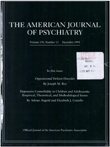Kleptomania: a report of 20 cases
Abstract
OBJECTIVE: The authors' objective was to provide phenomenologic, family history, and treatment response data on a group of rigorously diagnosed patients with kleptomania. METHOD: Twenty consecutive inpatients and outpatients met DSM-III-R criteria for current kleptomania or a past history of kleptomania. These patients were given structured diagnostic interviews, and their family histories of psychiatric disorders were assessed blindly. The patients' responses to psychosocial and biological treatments were also assessed. RESULTS: All of the kleptomanic patients had lifetime diagnoses of major mood disorders, 16 had lifetime diagnoses of anxiety disorders, and 12 had lifetime diagnoses of eating disorders. A high morbid risk of major mood disorders (0.31) was found in their first-degree relatives. Ten of 18 patients receiving thymoleptic medications reported reduction or remission of their stealing behavior. CONCLUSIONS: Kleptomania may be related to major mood disorder and perhaps may represent another form of "affective spectrum disorder."
Access content
To read the fulltext, please use one of the options below to sign in or purchase access.- Personal login
- Institutional Login
- Sign in via OpenAthens
- Register for access
-
Please login/register if you wish to pair your device and check access availability.
Not a subscriber?
PsychiatryOnline subscription options offer access to the DSM-5 library, books, journals, CME, and patient resources. This all-in-one virtual library provides psychiatrists and mental health professionals with key resources for diagnosis, treatment, research, and professional development.
Need more help? PsychiatryOnline Customer Service may be reached by emailing [email protected] or by calling 800-368-5777 (in the U.S.) or 703-907-7322 (outside the U.S.).



